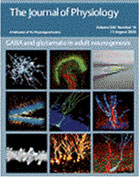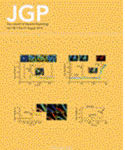VEGA 2/0190/10
Mechanisms of regulation of the diastolic activity of the ryanodine receptor
Principal Investigator: Alexandra ZahradníkováDuration: January 2010 – December 2012
|
Annotation:Defects of myocardial diastolic function that occur in failing heart or due to mutations in the calcium release channel RyR may result in reduced calcium contents of the intracellular stores. At the same time they may, however, induce spontaneous calcium release during the diastole. Spontaneous calcium release may generate action potentials by activating the Na/Ca exchange. Diastolic regulation of calcium store contents by RyRs can be observed as “calcium sparks” by means of confocal microscopy. Regulation of RyR activity at low levels of cytoplasmic Ca2+ is not clearly understood yet. In this project we propose to study modulation of RyR activity by natural regulators such as ATP, Mg2+ and luminal calcium at the level of single RyR channels and at the level of isolated cardiac myocytes. The results of the project will enable deeper understanding of control mechanisms governing RyR activity during the diastole and identification of their malfunction in cardiac diseases. |
Keywords:Calcium signalling, ventricular myocyte, ryanodine receptor, planar lipid bilayers, confocal microscopy, mathematical modelling |
Objectives:The overall objective of the project is to characterize the mechanisms of regulation of RyR activity during the diastole and the consequences of defects of RyR regulation in cardiac diseases. The specific aims to reach this goal are:
|
Publications: |
 |
Zahradnikova A, Zahradnik I (2012). Construction of calcium release sites in cardiac myocytes. Front Physiol 3: 322. |
 |
Janicek R, Zahradnikova-Jr A, Polakova E, Pavelkova J, Zahradnik I, Zahradnikova A (2012): Calcium spike variability in cardiac myocytes results from activation of small cohorts of RYR2 channels. J Physiol 590: 5091-5106. |
 |
Tencerova B, Zahradnikova A, Gaburjakova J, Gaburjakova M (2012): Luminal Ca2+ controls activation of the cardiac ryanodine receptor by ATP. J Gen Physiol 140: 93-108. |
 |
Bauerova-Hlinkova V,Bauer J, Hostinova E, Gasperik J, Beck K, Borko L, Faltinova A, Zahradnikova A, Sevcik J (2011): Bioinformatics Domain Structure Prediction and Homology Modeling of Human Ryanodine Receptor 2. Editor Mahmood A. Mahdavi. In Bioinformatics-Trends and Methodologies. – Rijeka, p. 325-352. ISBN 978-953-307-282-1. |
 |
Bauerova-Hlinkova V, Hostinova E, Gasperik J, Beck K, Borko L, Lai FA, Zahradnikova A, Sevcik J (2010): Bioinformatic mapping and production of recombinant N-terminal domains of human cardiac ryanodine receptor 2.. Protein Expr. Purif 71:33-41. |
 |
Zahradnikova A, Gaburjakova M Bridge JHB, Zahradnik I (2010): Challenging quantal calcium signaling in cardiac myocytes.. J Gen Physiol 136:581-583. |
 |
Zahradnikova A, Valent I, Zahradnik I (2010): Frequency and release flux of calcium sparks in rat cardiac myocytes: a relation to RYR gating. J Gen Physiol 136: 101-116. |

 contact
contact
